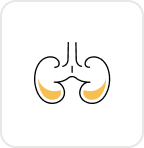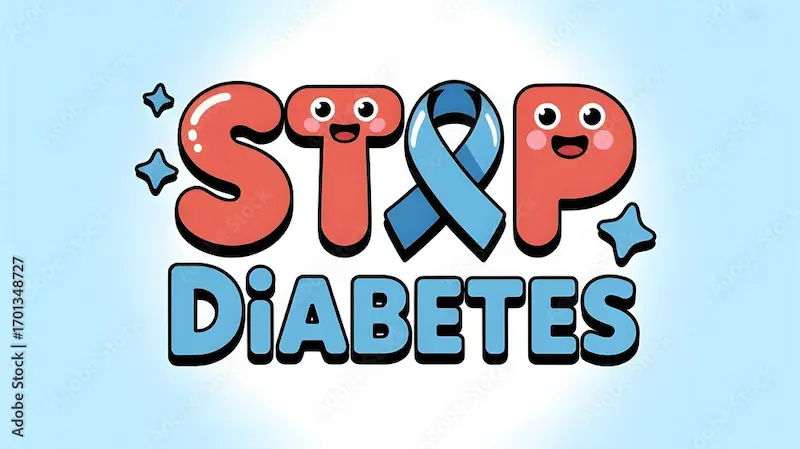Diabetes Insipidus: Causes, Symptoms, and Treatment
Learn about diabetes insipidus, its causes, symptoms, and treatment options. Understand how this rare condition affects fluid balance and ways to manage it effectively.


Introduction
Have you ever felt an unquenchable thirst, no matter how much you drink? Do you find yourself making countless trips to the bathroom day and night? While these could be signs of common conditions, they are also the hallmark symptoms of a rare but serious disorder called Diabetes Insipidus (DI). Despite its name, it has nothing to do with high blood sugar or the well-known diabetes mellitus. Instead, Diabetes Insipidus is a water balance problem rooted in the body's intricate hormone and kidney systems. This condition disrupts the body's ability to regulate fluids, leading to profound thirst and the production of large amounts of diluted urine. Understanding what leads to these signs is crucial for recognizing the condition and seeking timely help. This article will demystify Diabetes Insipidus, exploring its underlying causes, unmistakable symptoms, and the pathways to effective management, empowering you with the knowledge to take the next step for your health.
Diabetes Insipidus vs. Diabetes Mellitus: Understanding the Crucial Difference
The shared word "diabetes" causes much confusion. It comes from the Greek for "to siphon," referring to the excessive urine output common to both conditions. However, their fundamental causes are worlds apart.
The Role of Blood Sugar vs. The Role of Water Balance
Diabetes Mellitus (Type 1 & 2) is a disorder of blood sugar (glucose) regulation. It occurs due to a lack of insulin production or the body's inability to use insulin effectively, leading to high blood sugar levels. The kidneys excrete this excess sugar, pulling water along with it, which causes frequent urination.
Diabetes Insipidus is a disorder of water balance. It is caused by a problem with antidiuretic hormone (ADH, or vasopressin); either the body doesn't make enough of it (Central DI) or the kidneys don't respond to it properly (Nephrogenic DI). This results in the kidneys removing too much fluid from the body, producing large amounts of very dilute, "insipid" (tasteless) urine, regardless of blood sugar levels.
Consult an Endocrinologist for the best advice
The Root Causes: What Leads to Diabetes Insipidus
The signs of Diabetes Insipidus manifest due to a breakdown in the body's water conservation system. The specific cause determines the type of DI and guides the treatment approach.
Central Diabetes Insipidus (Neurogenic DI)
This form occurs when the hypothalamus (which produces ADH) or the pituitary gland (which stores and releases it) is damaged. This leads to a deficiency of the antidiuretic hormone.
- Head Injuries and Surgery: Any trauma, surgery, or infection near the pituitary gland can disrupt its function and is a common cause of acquired Central DI.
- Tumours and Diseases Affecting the Pituitary: Tumours, both cancerous and non-cancerous, can compress the gland. Other diseases like sarcoidosis, histiocytosis, or autoimmune conditions can cause inflammation and damage.
- Genetic Disorders and Family History: In rare cases, a genetic mutation affecting ADH production can cause hereditary Central DI, though this often presents in infancy.
Nephrogenic Diabetes Insipidus
In this type, the pituitary gland produces enough ADH, but the kidneys' nephrons are resistant to its effects. They fail to reabsorb water back into the bloodstream, causing it to be lost as urine.
- Medications Leading to Kidney Resistance: Certain drugs, notably lithium (used for bipolar disorder) and some antibiotics like demeclocycline, can damage the kidneys' tubules and cause nephrogenic diabetes insipidus.
- Chronic Kidney Diseases and Disorders: Conditions like polycystic kidney disease, urinary tract obstructions, or high calcium levels (hypercalcemia) can impair the kidney's ability to respond to ADH.
- Genetic Causes and Hereditary Factors: Mutations in the genes that code for the ADH receptor or the water channels (aquaporins) in the kidney can cause a hereditary form of Nephrogenic DI, which primarily affects males.
Less Common Types: Dipsogenic and Gestational DI
- Dipsogenic DI: Caused by a defect in the thirst mechanism, located in the hypothalamus. People drink excessive fluids, which suppresses ADH and leads to high urine output.
- Gestational DI: Occurs only during pregnancy when an enzyme made by the placenta destroys the mother's ADH. It usually resolves after delivery.
Recognizing the Signs: Symptoms of Diabetes Insipidus
The symptoms are directly tied to the body's inability to conserve water.
Extreme Thirst (Polydipsia) and Excessive Urine Output (Polyuria)
The two primary signs are overwhelming, intense thirst, often for ice-cold water, and the excretion of an enormous volume of pale, diluted urine. It's not uncommon for a person with DI to pass 3 to 20 quarts of urine per day, compared to the average 1-2 quarts. This leads to waking up multiple times at night to urinate (nocturia).
Dehydration Warning Signs
Despite drinking large volumes, the body can't always keep up with the losses. Signs of dehydration include:
- Dry skin and mucous membranes
- Fatigue, dizziness, and confusion
- Muscle weakness
- Constipation
- Unexplained weight loss
Symptoms in Infants and Young Children
Diagnosing DI in children who can't express thirst is critical. Watch for:
- Excessive crying and irritability
- Unusually wet diapers or bedwetting that persists
- Fever, vomiting, or diarrhea
- Delayed growth and weight gain
How is Diabetes Insipidus Diagnosed?
Because symptoms mimic other conditions, specific tests are needed. If you experience these persistent symptoms, consult a doctor online with Apollo24|7 for an initial evaluation and to discuss necessary tests.
- The Water Deprivation Test: The gold standard. Conducted under strict medical supervision, you stop drinking fluids for a period. Doctors measure changes in body weight, urine output, and composition to see if your body can concentrate urine.
- Blood and Urine Tests for Osmolality and Electrolytes: These measure the concentration of particles in your blood and urine. In DI, blood osmolality is high (concentrated blood) while urine osmolality is low (dilute urine). Apollo24|7 offers convenient home collection for tests like electrolyte panels to aid in diagnosis.
- MRI and Genetic Testing: An MRI can scan the pituitary gland for abnormalities. Genetic testing may be recommended if a hereditary cause is suspected.
Get Your Health Assessed
Managing and Treating Diabetes Insipidus
The goal is to reduce urine output and prevent dehydration, tailored to the type of DI.
Treatment for Central DI: Synthetic Hormone Therapy (Desmopressin)
This is the primary treatment. Desmopressin is a synthetic version of ADH administered as a nasal spray, tablet, or injection. It effectively replaces the missing hormone.
Managing Nephrogenic DI: Diet, Drugs, and Hydration
Since the kidneys don't respond to ADH, treatment is more complex:
- Hydration: Ensuring adequate fluid intake is paramount.
- Medication Adjustment: If a drug like lithium is the cause, a doctor may adjust the dosage or switch medications.
- Low-Salt Diet: Reducing sodium intake helps the kidneys produce less urine.
- Thiazide Diuretics: Paradoxically, these water pills can help reduce urine volume in Nephrogenic DI.
Potential Complications if Left Untreated
The most severe risk is dehydration, which can lead to electrolyte imbalances. Sodium levels can become dangerously high (hypernatraemia), causing confusion, seizures, brain swelling, and even coma. Chronic, untreated DI can also lead to kidney damage and bladder enlargement due to constant high urine volume.
When to See a Doctor
You should seek immediate medical advice if you or your child are experiencing the two main signs: extreme, unquenchable thirst and excessive urination. If these symptoms persist beyond a week, consult a doctor for a comprehensive examination and diagnosis. Early intervention is key to preventing complications.
Conclusion
Understanding what leads to the signs of Diabetes Insipidus is the first step toward reclaiming control of your health. This condition, centered on a disruption of the body's delicate water-balancing act, presents with unmistakable symptoms like profound thirst and high urine output that should not be ignored. While it can be daunting to navigate a rare diagnosis, effective management strategies are available. From hormone replacement therapy to lifestyle adjustments, a normal quality of life is entirely achievable with proper medical guidance. Remember, listening to your body's signals is paramount. If you recognize these signs in yourself or a loved one, take action by consulting a healthcare professional to get the answers and care you deserve.
Consult an Endocrinologist for the best advice
Consult an Endocrinologist for the best advice

Dr. Anand Ravi
General Physician
2 Years • MBBS
Bengaluru
PRESTIGE SHANTHINIKETAN - SOCIETY CLINIC, Bengaluru

Dr. E Prabhakar Sastry
General Physician/ Internal Medicine Specialist
40 Years • MD(Internal Medicine)
Manikonda Jagir
Apollo Clinic, Manikonda, Manikonda Jagir
(175+ Patients)

Dr. Arunava Ghosh
General Physician/ Internal Medicine Specialist
10 Years • MBBS,MD(GENL.MED.),DM(ENDOCRINOLOGY)
Kolkata
VDC Clinic, Kolkata

Dr Venkata Naga Sai Tribhushan Rambhatla
General Physician
3 Years • MBBS
Bengaluru
PRESTIGE SHANTHINIKETAN - SOCIETY CLINIC, Bengaluru
Aditya Singh
Endocrinologist
8 Years • MBBS
Bengaluru
Apollo One Electronic City, Bengaluru
Consult an Endocrinologist for the best advice

Dr. Anand Ravi
General Physician
2 Years • MBBS
Bengaluru
PRESTIGE SHANTHINIKETAN - SOCIETY CLINIC, Bengaluru

Dr. E Prabhakar Sastry
General Physician/ Internal Medicine Specialist
40 Years • MD(Internal Medicine)
Manikonda Jagir
Apollo Clinic, Manikonda, Manikonda Jagir
(175+ Patients)

Dr. Arunava Ghosh
General Physician/ Internal Medicine Specialist
10 Years • MBBS,MD(GENL.MED.),DM(ENDOCRINOLOGY)
Kolkata
VDC Clinic, Kolkata

Dr Venkata Naga Sai Tribhushan Rambhatla
General Physician
3 Years • MBBS
Bengaluru
PRESTIGE SHANTHINIKETAN - SOCIETY CLINIC, Bengaluru
Aditya Singh
Endocrinologist
8 Years • MBBS
Bengaluru
Apollo One Electronic City, Bengaluru
More articles from Diabetes
Frequently Asked Questions
Can diabetes insipidus be cured?
It depends on the cause. Central DI caused by injury can sometimes resolve on its own. Gestational DI usually resolves after pregnancy. For most, it's a chronic condition that can be effectively managed with medication and lifestyle changes, but not necessarily 'cured.'
Is diabetes insipidus a life-threatening condition?
It can be if left untreated, primarily due to the risk of severe dehydration and electrolyte imbalance leading to coma. However, with proper diagnosis and consistent management, people with DI lead full, healthy lives.
What is the difference between central and nephrogenic diabetes insipidus?
The difference lies in the cause. Central DI is a 'supply problem' (not enough ADH hormone is produced). Nephrogenic DI is a 'response problem' (the kidneys don't respond to the ADH that is present).
Can you develop diabetes insipidus later in life?
Absolutely. Acquired forms of DI are more common than genetic ones. They can develop after a head injury, surgery, due to a tumour, or as a side effect of certain medications like lithium.
How much water should someone with diabetes insipidus drink?
They should drink enough to satisfy their thirst and match their high urine output. The amount varies per individual. During illness or hot weather, fluid intake must be increased vigilantly to prevent dehydration. A doctor provides personalized guidance.




